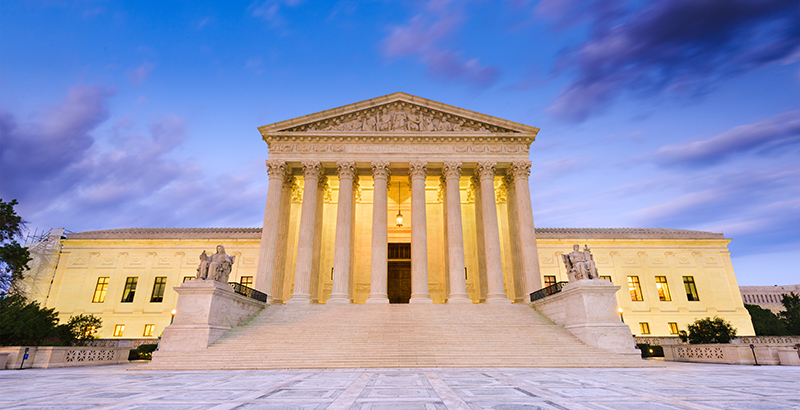Antonucci: What If the Supreme Court Rules in Favor of Teachers Unions in the Janus Case?

Mike Antonucci’s Union Report appears Wednesdays; see the full archive
We are close to a ruling by the U.S. Supreme Court in Janus v. AFSCME, the case that will determine whether government unions can continue to charge non-members a fee for representing them.
Trump appointee Neil Gorsuch joined the court after a 4–4 deadlock in Friedrichs, a similar challenge to union practices, leading legal observers to predict the justices will hand down a 5–4 decision against labor.
Public sector unions are acting accordingly. The National Education Association has already crafted a $50 million cut to its operating budget, and other unions are planning similar reductions. Activists on both sides of the issue have proceeded from the foregone conclusion that the court will strike down agency fees.
Foregone conclusions make me uneasy. I am reminded that in 2012 Chief Justice John Roberts changed his mind, deciding to uphold the Affordable Care Act’s individual mandate, while writing an opinion to strike it down. The outcome of Friedrichs v. CTA was derailed by the death of Justice Antonin Scalia, who presumably would have voted against the union.
So while it is an excellent betting proposition to assume the court will strike down agency fees, it isn’t as certain as the sunrise. What if the day dawns sunny for the American Federation of State, County, and Municipal Employees — the defendants in Janus — for NEA, and for hundreds of other government unions?
The least likely outcome is that the 1977 Abood decision, which created the agency fee system, will be upheld in its entirety. Back then, the court ruled that a public-sector union could charge non-members for services “germane” to its duties as exclusive bargaining representative. The justices deliberately shied away from specifying where the “germane” line would be drawn, leading to 40 years of unions, arbitrators, and judges trying to make that determination.
Unions are fond of pointing out that Abood was a unanimous decision. This suggests to me that they never read the individual and concurring opinions.
Justice Potter Stewart was concerned about placing upon employees “the considerable burden of monitoring all of the numerous and shifting expenditures made by the union that are unrelated to its duties as exclusive bargaining representative.”
Justice William Rehnquist wrote that “the positions taken by public employees’ unions in connection with their collective bargaining activities inevitably touch upon political concern if the word ‘political’ be taken in its normal meaning.”
The opinion of Justice Lewis Powell, with which Chief Justice Warren Burger and Justice Harry Blackmun concurred, was even more forceful. “Such a sweeping limitation of First Amendment rights by the court is not only unnecessary on this record; it is in my view unsupported by either precedent or reason,” he wrote.
So even while deciding the case that instituted agency fees, the justices were less than thrilled with the idea. They viewed agency fees as a compromise between forcing all public employees to pay full dues, which was the norm at the time, and having them pay nothing.
Today’s court may decide to amend Abood rather than get rid of it. One possible solution is to limit agency fees to services that unions are statutorily required to provide, such as the negotiation and enforcement of the collective bargaining agreement. This would align, for example, with a union-backed law recently enacted in the state of New York that allows unions to deny legal representation and other benefits to non-members.
Non-members who want to retain access to those services will have to join the union. But the drawback for unions is that agency fees will become much smaller, increasing the financial incentive to leave the union.
Unions will reap a huge public relations victory should the court retain fees in any form. Even better, they will no longer have the need to significantly reduce budgets or devote resources to recruitment. What would they do with all that “found” money?
When trying to predict what government unions will do in the future, I always expect that they will continue to do what they have done in the past. We would see an immediate and huge surge in political and campaign spending in an effort to reverse what unions see as years of playing defense. With a reasonably strong economy and the likelihood of Democratic gains across the board, the unions will mount pressure for increased government spending, especially for education.
Since a remarkable 57 percent of teachers say they have heard “nothing at all” about the Janus case, any Supreme Court ruling that supports the status quo will go unnoticed in our nation’s classrooms. There it will be as if Janus never existed.
The unions’ oral arguments before the court included the notion that agency fees were the price that must be paid for labor peace. Should the court defy expectations and uphold Abood, there will be more walkouts and large job actions, not fewer. Don’t expect to rest in (labor) peace.
Help fund stories like this. Donate now!

;)